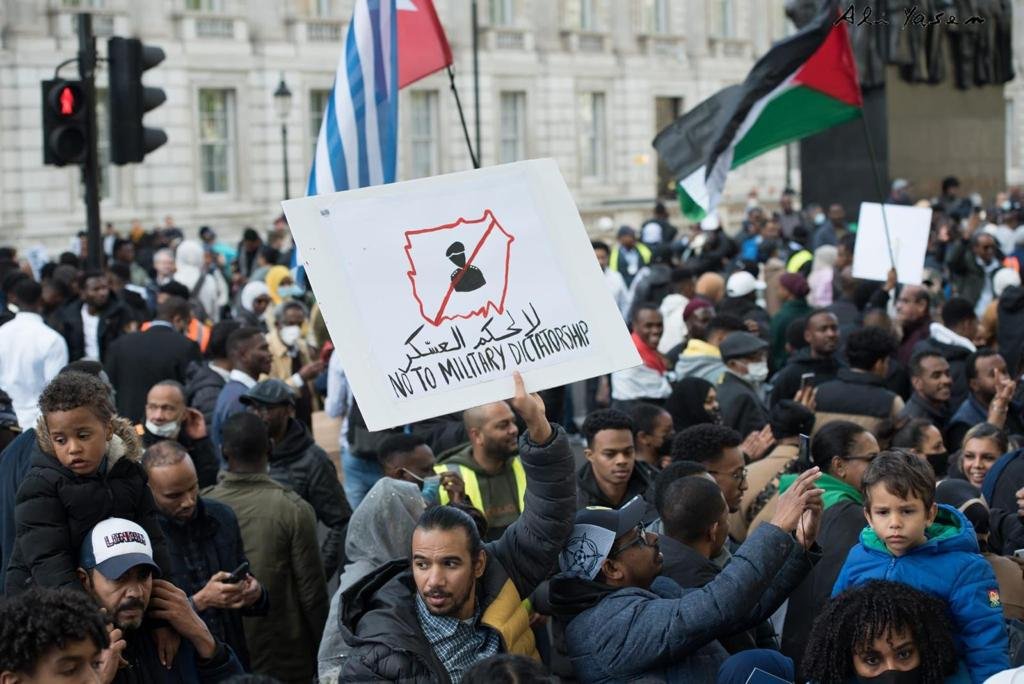Sudan’s Anti Coup Protest: What You Need to Know
“There are so many people on the street. I have never seen this amount of people before”. These were the words of a friend as I called him on the morning of Saturday, October 30th, to check on him before he joined demonstrators on the streets of Khartoum, protesting the recent coup in Sudan.
As I was leaving my flat to join protesters in London, I couldn't help but feel worried and anxious for the safety of everyone in Sudan. But I was also filled with excitement, people made it very clear this time, they do not want the military to rule again.
What happened in Sudan?
On the 25th of October, news of a coup emerged from Sudan. Several civilian government officials, the Prime Minister Abdalla Hamdok and his wife were arrested and led to an unknown location.
General Abdel-Fattah al-Burhan, the head of the military and the Transitional Sovereign Council, announced on national TV that he was dissolving the government and the council and declared a state of emergency. He added that the military will appoint a technocratic government to lead until an election is set in 2023.
Following the news of the arrests, people flooded to the streets to protest the coup and demand a peaceful transition to a civilian government. A civil disobedience campaign spread across the country, many businesses, restaurants, and banks closed in preparation for nationwide demonstrations.
The demonstrations were called for by pro-democracy groups that included political activists and the Sudanese Professional Association, who were instrumental in organising the 2019 protests. In addition to the Sudanese resistance committees, a grassroots neighbourhood network of Sudanese residents that played a key role during the Sudanese revolution in 2019.
In an attempt to stop people from organising, the government shut down the internet and blocked domestic phone calls. The only way to communicate was through international phone calls. However, activists abroad and in Sudan managed to coordinate their efforts and print hundreds of leaflets to distribute on the streets of multiple cities in Sudan and organise the protest on the 30th of October.
Despite the disruption of Internet services, videos were posted on social media showing hundreds of thousands marching and chanting “The people are stronger, stronger!” and “Retreat is not an option!”.
What led to the coup?
Since the ousting of Omar al-Bashir in 2019, Sudan has been run by a Transitional Sovereign Council. The council came as part of a power-sharing agreement between the Transitional Military Council (‘TMC’), which took power after al-Bashir was ousted and the Forces for Freedom and Change (‘FFC’), a political coalition that included the Sudanese Professionals Association, and members from opposition political parties and groups. The council was composed of 11 members, five military personnel and six civilians.
Under the agreement, the council was set to rule Sudan for three years. During these years, the military led by General al-Burhan was to head the council for 21 months and a civilian leader was to follow in heading the council for the remaining 18 months. This transition was supposed to take place in November of this year.
In the last few weeks, the civilian component of the council has been calling for the military to hand over the leadership. This has added to the tension between the two groups and rumours began to spread that the military was planning a takeover.
A few days before the coup, a group of conservative Islamists staged a small demonstration to call for a military government, which was followed by a massive counter-protest by the pro-democracy camp. Hundreds of thousands took to the streets on October 21st in support of civilian and democratic rule.
Protests from afar
The demonstrations against the coup didn’t stop in Sudan. Across the world and in major cities like London, New York, Dublin, Los Angeles, Toronto and more, the Sudanese communities organised demonstrations to show solidarity and attempt to force Sudan’s military to hand over the power of government to civilians.
The community in London has been protesting outside of the Sudanese embassy in London every day since the coup, calling for the release of the arrested civilian leaders and for the military to step down.
Activism by the Sudanese diaspora is not new. They have played an important role in the fall of al-Bashir and in raising awareness about human rights violations committed by the previous regime during the past 30 years. Sudanese communities have been active in social media; sharing and informing the world about the revolution. They have also gathered together to lobby their government in their new homes, organise demonstrations and raise funds to support those in Sudan who have lost their source of income as a result of the "stay-at-home" strikes, which left the street of Khartoum empty and businesses closed.
Since the 2018 revolution, people have worked relentlessly to transform Sudan into a democratic nation. And, despite last week's coup and what it represents, people's determination to move ahead has proved to be stronger than ever.





